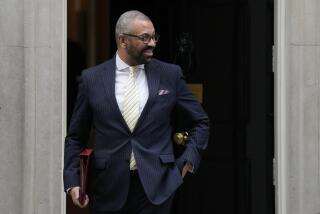ACTION IN THE FINANCIAL MARKETS : OVERSEAS : Britain to Tie Currency to EC Nations
- Share via
LONDON — In a surprise announcement, Britain said Friday that it would tie its pound to other European currencies, thus yielding a degree of economic sovereignty to the increasingly powerful European Community after years of opposing the idea.
The news that Britain, renowned for its go-it-alone attitude, would enter the European Community’s exchange rate mechanism sent the pound soaring. Stocks raced higher in London’s financial district, where trading was frenzied. The news even gave Wall Street a brief boost.
In another move, the government cut interest rates by 1 percentage point to 14% and reinforced hopes that Britain’s skyrocketing inflation rate may have peaked.
After it enters the currency system Monday, Britain thereafter must adjust its economic policies and interest rates to ensure that the pound stays in a certain range against other currencies in the system.
These currencies are the Spanish peseta, German mark, French franc, Dutch guilder, Italian lira, Belgian and Luxembourg francs, Danish krone and Irish pound. The Portuguese escudo and Greek drachma are the only remaining outsiders as the 12 members of the European Community rush to close ranks and become a powerhouse to rival Japan and the United States.
Under the EC currency grid, which is part of a wider European Monetary System, central banks must intervene if currencies stray outside their bands.
British Prime Minister Margaret Thatcher has said joining forces would restrict her control over economic policy. On Friday, however, she decided the decision was “right for the times.”
The battle over joining the 11-year-old system has become a broader symbol of the depth of Britain’s commitment to the EC, as fellow members repeatedly urged London to bolster EC efforts to forge an economic and monetary union and cut currency volatility.
London’s stock market fell at the opening but the news sent the index shooting up about 100 points from the day’s low point, and trading was extended by an hour. The bellwether Financial Times-Stock Exchange 100-share index closed up 73.5 points, or 3.55%, at 2,143.9. Wall Street also rose on the news before stocks drifted lower.
Britain has proposed to fellow EC members, whose officials meet today in Brussels, that the pound should enter the mechanism worth 2.95 German marks and be allowed to fluctuate 6% on either side of that. Monetary sources in Brussels said other EC members must approve the rate at which Britain will enter.
After Friday’s news, the pound topped 3 marks and, relative to the U.S. dollar, rose to $1.9630 from Thursday’s $1.9145.
Thatcher had previously insisted that British inflation, which has hit an eight-year high of 10.6%, should move lower before Britain jumps on the exchange rate bandwagon.
A strong pound is crucial to efforts to lower inflation, as a high exchange rate cuts the cost of imports.
The government said inflation may head higher amid rising oil prices, but Thatcher said there were “uncontestable signs that the economy is working in the way that we intended.”
However, Thatcher still balked at the idea of a pan-European currency. Asked if she had softened her opposition on that, Thatcher replied, “Not in any way at all.”
More to Read
Sign up for Essential California
The most important California stories and recommendations in your inbox every morning.
You may occasionally receive promotional content from the Los Angeles Times.













